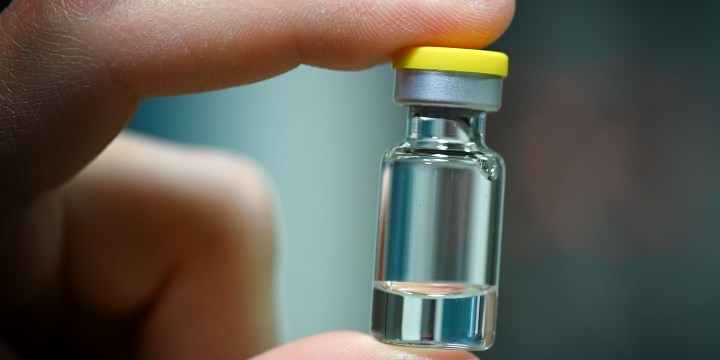BUSINESS MAVERICK 168 OP-ED
Government should be buying its pharmaceuticals locally — especially now

Someone very special to me is ill with multidrug-resistant TB. As TB is the leading cause of death in South Africa, and a particularly unpleasant disease, this is a scary diagnosis. But she is young, receiving the best of care and will survive.
First published in DM168
However, 15 years ago there was no treatment and 10 years ago the treatment entailed months of daily injections with horrible side-effects that included nerve damage and going deaf. Permanently.
There are, thankfully, newer drugs available. But as with all things in medicine, the more effective your drug, and the fewer side-effects it has, the more expensive it is. Some of these drugs, like Bedaquiline, can set you back $120,000 for the two years of treatment you require — although luckily this drug is sponsored in South Africa.
Someone equally close to me is suffering the lingering and possibly long-lasting effects of Covid-19. He has zero energy, shortness of breath and is just not “present”.
So, I am watching the news announcements about the development of the novel coronavirus vaccines with a more than passing interest — as are the markets, which have reacted positively.
While Africa continues to grapple with some of the world’s more pernicious diseases — HIV/Aids, malaria, Ebola — global pharma has thrown its collective resources at the development of a novel coronavirus vaccine. The level of development is unprecedented (some would say orchestrated), but I’m hopeful that in the longer run it stimulates vaccine development across the board, and in Africa and South Africa, in particular.
According to the New York Times’s coronavirus tracker, researchers are testing 54 vaccines in clinical trials on humans, and at least 87 preclinical vaccines are under investigation in animals.
Both Moderna and Pfizer have reached stage three of clinical trials and in both cases the drugs appear to be about 95% effective.
It helps that governments are throwing billions at the problem. The US government provided almost $11-billion in support to various companies. In two decades TB has received perhaps one-hundredth of that figure.
Pharmaceutical companies have already begun inking deals to deliver large orders to countries around the world. Of course, questions are being asked about the cost of the drugs and equitable access for less developed nations. Unfortunately, Africa remains dependent on vaccine developers and manufacturers on other continents for access to vaccines.
Despite much political talk about prioritising vaccine development as well as manufacturing capabilities across the continent, there has not been any discovery of a new vaccine that has been led by African scientists. This is largely a consequence of the systematic underinvestment on the part of governments and the private sector in the field of research and development, says Shabir Madhi, professor of vaccinology at Wits.
I acknowledge that there are challenges in this regard, but as this is the week in which the government’s third South African Investment Conference got off to a creaky start, I couldn’t help wondering what the government could do to support and grow existing businesses, along with its determination to solicit new investment.
For instance, Aspen has a world-class manufacturing plant under our noses in Port Elizabeth, and will manufacture a coronavirus vaccine for Johnson & Johnson when the time comes. This is a truly noteworthy achievement. Yet local manufacturers’ share of the government’s annual antiretroviral spend is dwindling. That’s because it is no longer commercially viable as the government favours imported generic drugs over those manufactured locally. Yes, they are a bit cheaper — but is this not weighing short-term economics over longer-term benefit for South Africa?
Meanwhile, the timeline for the creation of a new tuberculosis vaccine remains uncertain.
It is easy to be cynical about this. TB is the disease of poverty, of people that are disadvantaged, whereas coronavirus can affect any of us, from the president of the United States down to the very disadvantaged person. Yet again, there is a positive and that is that the lessons emerging from the ultrafast development of a coronavirus vaccine may trickle down to benefit the development of new TB medicines.
One of the key lessons is how collaboration — between drug developers, funders and regulators — really helped to accelerate the development of the vaccine.
Aspen has demonstrated that it is possible to operate a successful pharmaceutical business from the southernmost tip of Africa. What it has also shown is that manufacturing low-cost drugs for the mass market, such as HIV/Aids drugs, is not commercially viable without the buy-in of the regulator and the government. The same applies to TB.
So while South Africa is benefiting from a wave of positive global sentiment that has positively impacted on the rand, bonds and equities, this wave can just as quickly retreat as investor risk appetite dries up. What is more sustainable, and the government does recognise this to a degree, is an investment in the local economy. And there is no reason this should not include the cutting-edge worlds of pharmaceuticals and biotechnology. DM168


















The lack of encouragement for local manufacture and the onerous labour legislation particularly, make local endeavour less and less attractive.
There is little advantage in tenders for local manufacturers, many of whom have large investment in infrastructure and make significant contributions to the tax base and to employment.
The pandemic has also shown how vulnerable our Country is to embargoes on critical products as exporting countries (justifiably) ensure that local demand is met before exports are allowed.
We need to become self-sufficient in the supply of critical food and medical products as quickly as possible and incentives need to be given to achieve this.